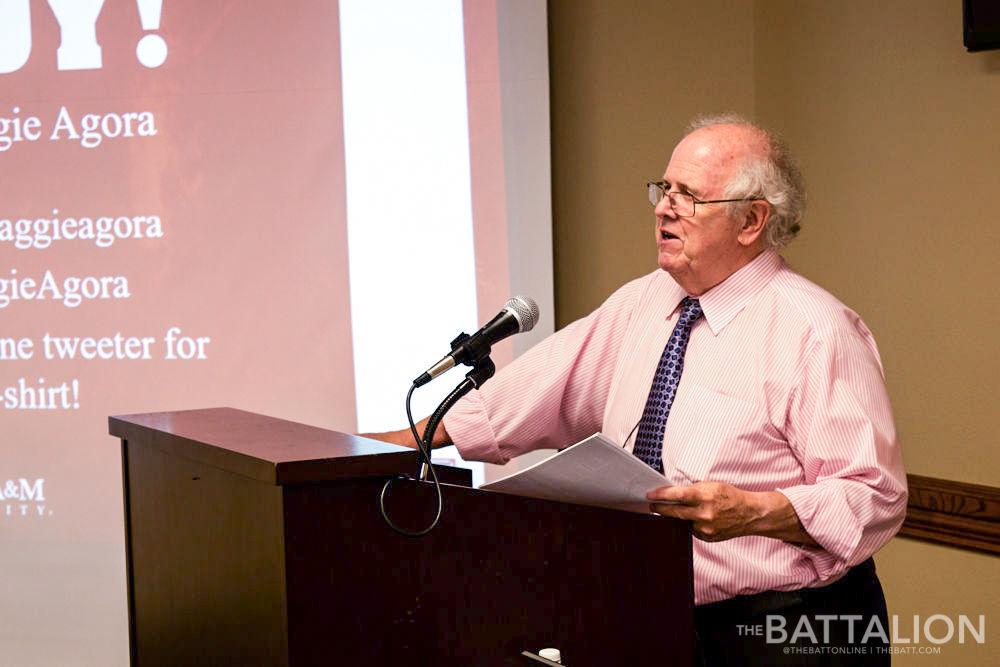In 1966, Battalion Editor-in-Chief Thomas DeFrank was fired by University President James Earl Rudder. The incident was a landmark moment in The Battalion’s history, and one that prepared DeFrank for his long career in journalism.
Rudder had taken charge of Texas A&M in 1958 and ushered in a period of great change for the university. The Corps of Cadets became optional while women and people of color were being admitted for the first time. These transitions caused turmoil among Aggies who did not share Rudder’s vision. Rudder was working to transform the university into a modern research institute, but received backlash from some students and former students. In the spirit of attaining this status, Rudder’s administration took steps to control the flow of information, including what was printed in The Battalion.
In 1966, when DeFrank was named editor-in-chief, Rudder made it clear that The Battalion would be an extension of the university and was not allowed to print anything that clashed with A&M’s image. Rudder created a publication board and fired the paper’s advisor. Before this change, The Battalion had gone largely unsupervised by the administration for 79 years. DeFrank, along with the three editors prior to him, held a dim view of these restrictions.
“It was a classic censorship struggle between The Batt and the Rudder administration, which thought the student newspaper should be a good news feed for the university and nothing more,” DeFrank said. “The censorship got worse every year. When I was a sophomore, his agents began yanking columns that they didn’t like. When I was a junior, they started pulling editorials that they disagreed with, and by the time I was a senior they started pulling news stories they didn’t like.”
In September of 1966, DeFrank was accused of writing a column that was unfair to the administration. In response, the university inserted its name as editor of The Battalion and placed the word “student” in front of the titles of the remaining editorial staff, including DeFrank and managing editor Lani Prestwood.
After news of trouble at The Battalion was published by the Associated Press in Dallas, DeFrank was contacted to comment. He expressed his continuous concern with the censorship from the university, saying, “That is not the way a student newspaper should be run.” DeFrank said this was the final straw that ultimately led Rudder to remove him as editor.
DeFrank said he believes the Rudder administration spread the news of what was happening with The Battalion as a tactical plan to push student journalists out of the way.
DeFrank said one of Rudder’s staff members, Jim Lindsey, gathered the Battalion’s editors to tell them about the administration’s plans for the paper — and that Lindsey offered the editors a raise to comply or be removed from their positions.
According to DeFrank, Lindsey brought the story to the Associated Press himself, knowing that DeFrank would have no choice but to provide a comment and put his job in even greater jeopardy.
“Lindsey leaked this story to the AP,” DeFrank said. “Lindsey knew that I would not be able to just say ‘I have no comment on this.’ … They set us up.”
Once the news of the university censorship came to light, students began to protest. Although DeFrank was thankful for the support, it was too late. Even after being fired, DeFrank continued to voice his opinion throughout campus, calling on Rudder to end censorship.
With the hope to change the university’s policies, DeFrank said he encouraged the Southeastern Journalism Forum to reprimand A&M for its oppressive censorship of student journalism. This resulted in a furious administration, and an editorial by The Battalion staff that read, “DeFrank may be a fine student, but he is only trying to hurt Aggies.”
Even with protests and criticism from other universities, Rudder remained persistent in his plans for A&M.
“Earl Rudder was a one man band, and if you crossed him, you were done for,” DeFrank said. “He ruled with an iron hand, that’s for sure… And I still think Earl Rudder was a great man. He didn’t understand journalism or freedom of speech much, but he was a great man.”
Looking back at his years at A&M and the hardships he faced, DeFrank said his conflicts with Rudder made him the journalist he is today. As a contributing editor of The National Journal, DeFrank has covered the administrations of 10 U.S. presidents and received various threats and accolades for his writing.
DeFrank said that looking back, he’s grateful for the challenges he faced during his conflict with the A&M administration.
“In a left-handed sort of way, I owe General Rudder a debt of gratitude for helping me realize there is life after being screamed at and yelled at as a student editor,” DeFrank said. “What happened with me does not, at the least bit, diminish my affection for Texas A&M. Quite the contrary.”
Fired Battalion editor recalls his conflict with Rudder administration
October 3, 2018
Photo by FILE
Former editor-in-chief Thomas DeFrank speaks at an Aggie Agora event in Rudder Tower in 2016.
Donate to The Battalion
Your donation will support the student journalists of Texas A&M University - College Station. Your contribution will allow us to purchase equipment and cover our annual website hosting costs.




















